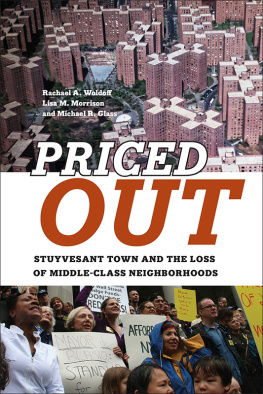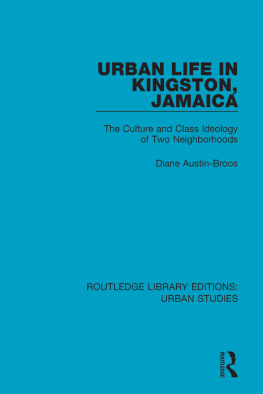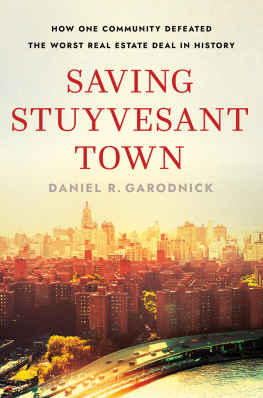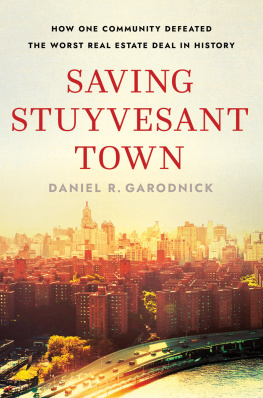Priced Out
Priced Out
Stuyvesant Town and the Loss of Middle-Class Neighborhoods
Rachael A. Woldoff Lisa M. Morrison Michael R. Glass
NEW YORK UNIVERSITY PRESS
New York and London
NEW YORK UNIVERSITY PRESS
New York and London
www.nyupress.org
2016 by New York University
All rights reserved
The views expressed are those of the authors and are not necessarily those of the United Nations.
References to Internet websites (URLs) were accurate at the time of writing. Neither the author nor New York University Press is responsible for URLs that may have expired or changed since the manuscript was prepared.
Library of Congress Cataloging-in-Publication Data
Names: Woldoff, Rachael, author. | Morrison, Lisa M., author. | Glass, Michael R., author.
Title: Priced out : Stuyvesant Town and the loss of middle-class neighborhoods / Rachael A. Woldoff, Lisa M. Morrison, and Michael R. Glass.
Description: New York : New York University Press, [2016] | Includes bibliographical references and index.
Identifiers: LCCN 2015043169 | ISBN 9781479812462 (cl : alk. paper) | ISBN 9781479818631 (pb : alk. paper)
Subjects: LCSH: HousingNew York (State)New YorkCase studies. | Rent controlNew York (State)New YorkCase studies. | Mixed-income housingNew York (State)New YorkCase studies. | Housing developmentNew York (State)New YorkCase studies. | NeighborhoodsNew York (State)New YorkCase studies. | Middle classNew York (State)New YorkCase studies.
Classification: LCC HD 7304. N W 2016 | DDC 7.3/36097471dc23
LC record available at http://lccn.loc.gov/2015043169
New York University Press books are printed on acid-free paper, and their binding materials are chosen for strength and durability. We strive to use environmentally responsible suppliers and materials to the greatest extent possible in publishing our books.
Manufactured in the United States of America
10 9 8 7 6 5 4 3 2 1
Also available as an ebook
For my husband and best friend, Robert Litchfield, and my magical babies, Roscoe and Rosabel. For everything and forever. RW
For my dad, who taught me how to get things done, and my daughter Lily, a constant source of creative inspiration. LM
For my parents. MG
Contents
We would like to thank our families for their support. This research project would not have been possible without the encouragement and assistance of Rob Litchfield. We are grateful for your honesty, encouragement, insights, and your critical mind. You have been our trusted listener, reader, and editor, and have graciously been the sounding board for every idea, debate, and revision. We have been fortunate to have you nurturing and pushing us.
We are also grateful for the effort and interest of our research assistants, Kent Hastings, Megan Nicholson, Miranda Riffle, Amira Samuel, Jordan Steinfeld, and Alixandra Tate. We thank Daniel May of the MetLife Archives for his assistance with historical documents and images pertaining to Stuyvesant Town. We also appreciate the assistance of the curators at the New York University Public Librarys Archives and Manuscripts collection and for their help with accessing the Robert Moses papers.
We extend thanks to the community of colleagues who were very helpful throughout the research and writing process, offering encouragement, providing feedback, engaging in insightful discussions, and sharing their support. We thank Manuel Aalbers, Charles Bagli, and Desiree Fields for their helpful comments on aspects of this research. We are especially grateful to Katrin Anacker, Ylana Beller, and Jerry Krase, whose careful reading and advice greatly improved the manuscript. We are so fortunate to have generous colleagues who share our passion for neighborhoods and cities and who cheer us on so we may improve our work.
We want to thank our editor from New York University Press. Ilene Kalish was enthusiastic about this study at an early stage in the process, and provided practical guidance toward the end. Karen Verde copyedited the book, and Robert Swanson indexed the content. We also thank the anonymous reviewers, as well as Sharon Zukin, who conducted an early and enthusiastic review of the book and offered useful suggestions.
Above all, we wish to express our deepest gratitude to the residents of Stuy Town, past and present, for sharing their time and stories.
- ANCHOR Alliance for Neighborhood Commerce, Homeownership, and Revitalization
- EPCA Emergency Price Control Act
- ETPA Emergency Tenant Protection Act
- HCR (New York) Homes and Community Renewal
- IAI Individual Apartment Improvement
- MCI Major Capital Improvements
- MHP MacCracken Housing Program
- NORC Naturally Occurring Retirement Communities
- NYCHA New York City Housing Authority
- NYU New York University
- PAR Petition for Administrative Review
- RCL Redevelopment Companies Law
- SCRIE Senior Citizen Rent Increase Exemption
The Transformation of Stuyvesant Town
When the war was over there was absolutely no housing for the veterans. Most of my friends either lived with parents or in-laws, and Herschel and I lived in an unfurnished room with one of my mothers neighbors who had a two-bedroom apartment, and one of the rooms was empty. We had a bed, a hamper, and a chest. That was it. My mother lived on the second floor. I ate there, showered there, and did everything there for just one room to sleep in. Then they built Stuy Town, and you had to apply for it. You could only be a veteran to move in. One of my neighbors moved in with her son. He was in the Navy, so he got the apartment, and his parents were able to live with him. Now, they take anybody. Kids from college? They take this room, and they divide it.
Ruthie Goldblum, longtime resident, aged eighty-five
I think my rent is going to keep going up. We tried to negotiate the rent and were told that they dont negotiate. Probably about two to three weeks ago [in June 2011], I was walking past the leasing office on First Avenue, and I noticed that it was packed full of people. There were so many people there that people were standing, and it was a Saturday, which I just thought was strange because Id never seen it that full. So I think demand is up for Stuy Town, and I think a lot of people are interested in moving in. It obviously helps that every single apartment has, or most apartments have, marble countertops, and theres dishwashers, and everything just looks a lot more suburban than other typical New York City apartments. So I think, if anything, these people moving in is just going to make the prices go up, because they know that if youre not willing to pay, someone else is going to move right in. And if its two people sharing itwhich a lot of times they have parents helping them outits not going to be a problem to split $2,500 in rent.
Jackie Sabatino, market-rate resident, aged twenty-eight
The first thing you see when you walk out of Stuyvesant Towns red brick tower apartment buildings on a Sunday morning is the odd mix of people who share this community. Wait a bit longer, and the clash of cultures that now characterize modern Stuyvesant Town become apparent. Walking along the landscaped paths and taking in the quiet, park-like setting, birds chirp as the early riserstypically, white professionals in their 20s, 30s, and 40swalk their dogs or take a run, and on weekdays, they rush off to work. Weekday mornings are far busier, as a cluster of parents hurry to get their children to school on time, and then hurry to their jobs.













